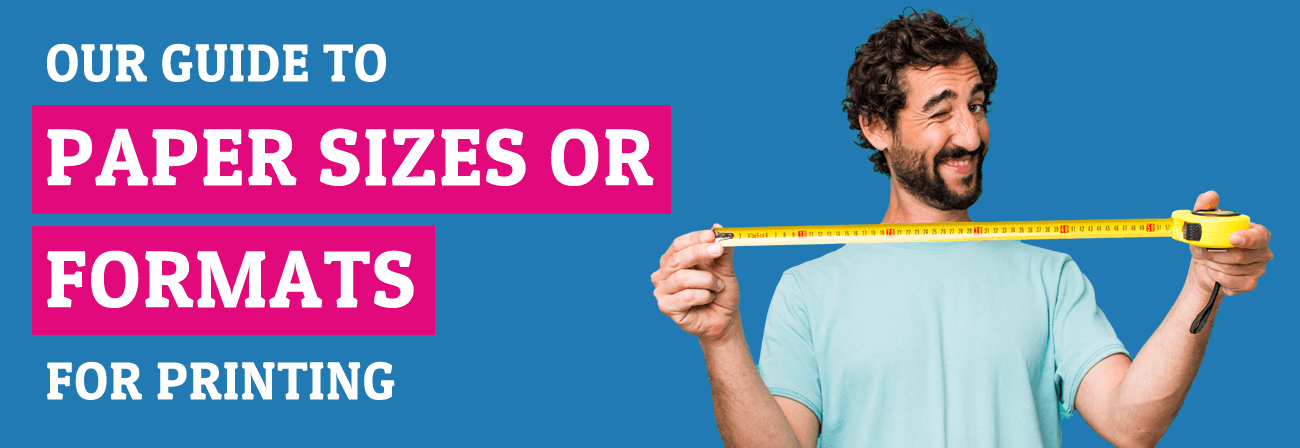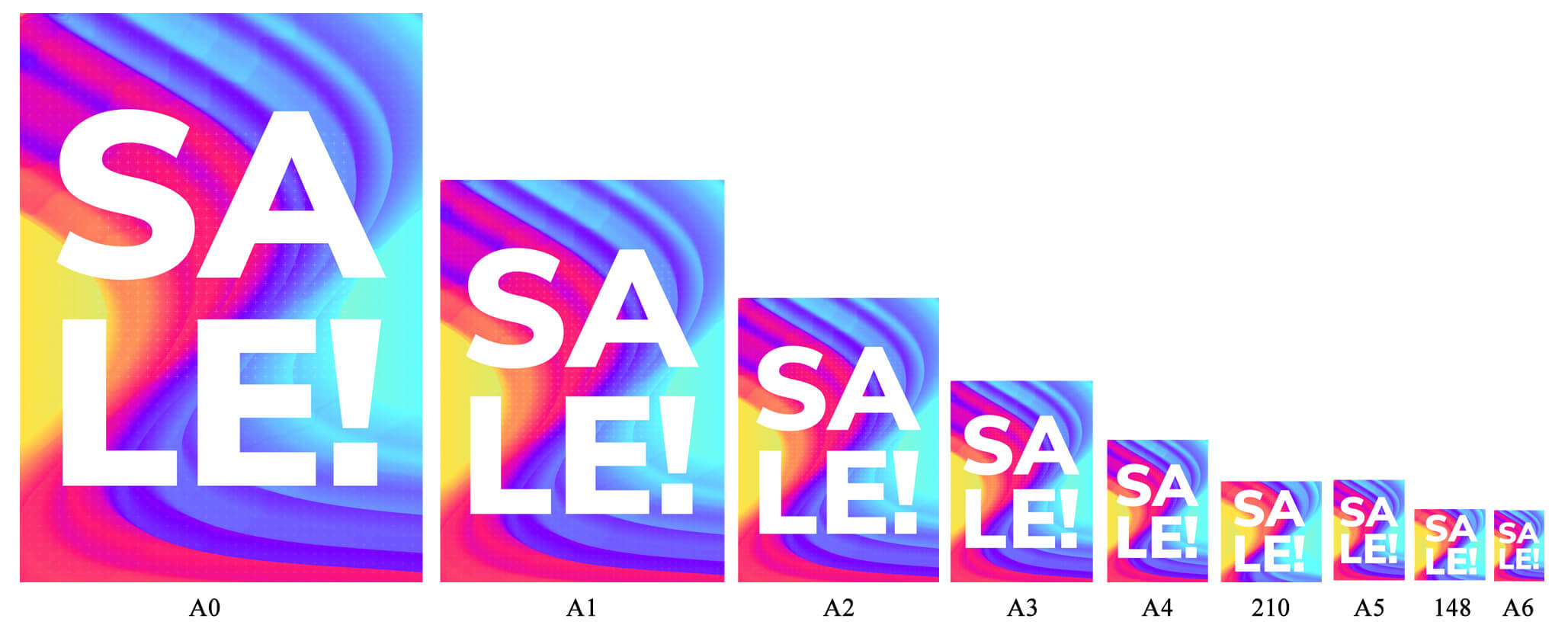Free nationwide shipping on all orders!
Simply, Affordable, Quality Print & Design in Staffordshire and the UK
Free nationwide shipping on all orders!
Simply, Affordable, Quality Print & Design in Staffordshire and the UK

Paper sizes are a hot topic in the printing world and when it comes to deciding on which size to use for printing, it’s a decision that could make or break a project. Today, we’ll answer all your burning questions about sizes of paper for printing and look at all their most common uses such as sizes for posters, leaflets, brochures, certifications, business cards, books and photos.
Maybe it’s a ream of A4 standard paper in your machine, a notepad on the coffee table or a poster watching over you on the wall. While these items are familiar everyday objects ultimately comparable to each other, they all differ in one thing: their size. Read on through our paper size guide to learn more!
We’ve all come across common paper sizes like A4 and A5, but who or what determines these standard sizes?

In other words, the width and the height of a page relate to each other like the side and the diagonal of a square. Now known as the ISO paper sizes, or German DIN 476 standard these page sizes are used across the world and are defined by letters such as A, B and C. Prior to this in the UK we were using imperial paper sizes and we adopted it as our standard after 1971.
French paper sizes were also different as well as a lot of other countries and some used their own imperial sizes. Standardising this on an international level within the paper industry allows for more control over the paper sizes used around the world. Prior to this anyone printing on paper would, not only have to worry about the different papers available but how and where it was going to be printed.
The main advantage of the paper formats defined by the ISO 216 standard for printing is its scale since you still preserve the aspect ratio when cutting or folding the paper in half. Now you have a bit more understanding of where today’s international paper size standards of size come from, let’s take a look at the different sizes available for printing.
This is what we used typically before the new standard was widely used and accepted. Typically used in the production of books, and were never used for other purposes. ‘Folio’ or ‘Foolscap’ is an alias for Foolscap Folio, as is ‘Kings’ being an alias for ‘Foolscap Quarto’.
| Size | Width × Height (mm) | Width × Height (in) |
|---|---|---|
| Dukes | 140 mm × 178 mm | 5.5 × 7 in |
| Foolscap | 203 mm × 330 mm | 8 × 13 in |
| Imperial | 178 mm × 229 mm | 7 × 9 in |
| Kings | 165 mm × 203 mm | 6.5 × 8 in |
| Quarto | 203 mm × 254 mm | 8 × 10 in |
If you’re like us, we use international paper sizes or metric paper sizes. Most of you’ll be very familiar with the common measurement of paper that begins with the convention ‘A’. As the most globally recognised paper measurement standard used almost everywhere other than American sizes, this A size of paper is the common standard business letter size used in English-speaking countries. The largest standardised A size in the A range is A0 and the smallest is A10, you can see the dimensions of the A series in the paper size chart below.
Please bear in mind that standard lengths and widths of the A series are rounded to the nearest millimetre and these are their typical trimmed sizes.
| Size | Size in Millimeters | Size in Inches |
|---|---|---|
| A0 | 841 mm × 1189 mm | 33.1 Inches × 46.8 Inches |
| A1 | 594 mm × 841 mm | 23.4 Inches × 33.1 Inches |
| A2 | 420 mm × 594 mm | 16.5 Inches × 23.4 Inches |
| A3 | 297 mm × 420 mm | 11.7 Inches × 16.5 Inches |
| A4 | 210 mm × 297 mm | 8.3 Inches × 11.7 Inches |
| A5 | 148 mm × 210 mm | 5.8 Inches × 8.3 Inches |
| A6 | 105 mm × 148 mm | 4.1 Inches × 5.8 Inches |
| A7 | 74 mm × 105 mm | 2.9 Inches × 4.1 Inches |
| A8 | 52 mm × 74 mm | 2.0 Inches × 2.9 Inches |
| A9 | 37 mm × 52 mm | 1.5 × Inches 2.0 Inches |
| A10 | 26 mm × 37 mm | 1.0 × Inches 1.5 Inches |
In addition to ‘A’ sizes, there are also ISO B sizes. This B series was designed to provide a wide range of size options for commercial printing and while following the same pattern as A, with B0 being the largest and B10 the smallest, their sizes are a little larger in comparison.
| Size | Size in Millimeters | Size in Inches |
|---|---|---|
| B0 | 1000 mm × 1414 mm | 39.4 × 55.7 |
| B1 | 707 mm × 1000 mm | 27.8 × 39.4 |
| B2 | 500 mm × 707 mm | 19.7 × 27.8 |
| B3 | 353 mm × 500 mm | 13.9 × 19.7 |
| B4 | 250 mm × 353 mm | 9.8 × 13.9 |
| B5 | 176 mm × 250 mm | 6.9 × 9.8 |
| B6 | 125 mm × 176 mm | 4.9 × 6.9 |
| B7 | 88 mm × 125 mm | 3.5 × 4.9 |
| B8 | 62 mm × 88 mm | 2.4 × 3.5 |
| B9 | 44 mm × 62 mm | 1.7 × 2.4 |
| B10 | 31 mm × 44 mm | 1.2 × 1.7 |
You guessed it! Following the A and B sizes for printing, there are also ISO C sizes. This series is most commonly used for envelopes with the C size falling nicely in between its A and B counterparts. The aspect ratio of the ISO paper sizes simplifies the task of fitting bigger sizes into smaller envelopes. For example, ISO A4 folded in half into two A5 would fit within a C5 envelope.
If you are a business searching for a new set of stationery and a range of branded envelopes, these are the sizes for you.
| Size | Size in Millimeters | Size in Inches |
|---|---|---|
| C0 | 917 mm × 1297 mm | 36.1 Inches × 51.1 Inches |
| C1 | 648 mm × 917 mm | 25.5 Inches × 36.1 Inches |
| C2 | 458 mm × 648 mm | 18.0 Inches × 25.5 Inches |
| C3 | 324 mm × 458 mm | 12.8 Inches × 18.0 Inches |
| C4 | 229 mm × 324 mm | 9.0 Inches × 12.8 Inches |
| C5 | 162 mm × 229 mm | 6.4 Inches × 9.0 Inches |
| C6 | 114 mm × 162 mm | 4.5 Inches × 6.4 Inches |
| C7 | 81 mm × 114 mm | 3.2 Inches × 4.5 Inches |
| C8 | 57 mm × 81 mm | 2.2 Inches × 3.2 Inches |
| C9 | 40 mm × 57 mm | 1.6 Inches × 2.2 Inches |
| C10 | 28 mm × 40 mm | 1.1 Inches × 1.6 Inches |
Now you’ve got a good idea of what sizes are available, let’s talk about some of the most common sizes for printing. Without a doubt, the most popular paper size around is a sheet of A4 – it is everywhere! Not only is it the size most people use in their home office printers, but its size is used as letter paper, stationery and leaflets.
It is the perfect size for most daily printing needs. The size you need will always be dependent on what you are producing and where you are in the world. For example, if you are after a leaflet you may use an A4 whereas if you need an A5 booklet you would use the next larger size within the A series to fold in half and collate the sheets to make the finished booklet.
Now let’s talk about you and your printing project. How to choose which size you need depends entirely on what it is you’re printing! From now on we will only talk about A-series paper as that’s what we use to produce your printed products.

This is the largest A size which we offer and measures a finished size of 841mm x 1189mm. Being the largest A size available we typically see this product used for wider or larger printing where the idea is to be seen from a distance. For example with our A0 sheet printing, we offer A0 Printed Posters, display boards & signs.
This is the second largest A size which we offer and measures a finished size of 594mm x 841mm. Being one of the largest sizes available we typically see this product used for large printing where the idea is to be seen from a distance. We offer A1 printed posters, Display Boards & signs of this size, for this very reason.
This is the third largest A size which we offer and measures a finished size of 420mm x 594mm. Not a huge size but still one of the largest sizes available. We typically see this size the same as A0 and A1 being used for wide printing where the idea is to be seen from a distance. We offer A2 Printed Posters, display boards & signs for this very reason.
An A3 piece of paper is twice the size of a standard A4 size. Measuring a comfortable 297mm x 420mm. While not excessively large this change in size opens this side up to a whole range of uses. That is not to say that they can’t be used as posters they can, and we do offer printed display boards in this size too. With the advancement of technology, people have been able to afford an A3 printer in their own homes. This is and has been for many years a staple size for the food industry, perfect for takeaways to print all of the menu choices in an excellent layout prompting us to order.
An A4 sheet of paper is the most common size paper used that we can all relate to! When we go to the supermarket and buy that pack of paper for our home printers this is typically the size available. Measuring 210 x 297 mm, we typically receive bank statements or bills in this format. They are the perfect letter format and documents can be prepared in this size in most software and most if not all can print this size. That’s not to say that that this is all this size is for, oh no.
The A4 size has a whole range of uses and we suppose that this is due to not only its size but also to the fact that in relation to us holding it in our hands, it seems to be the perfect size for a wide range of uses.
As we previously mentioned letters or printed Letterheads. Many Stapled Brochures or booklets are also great in this size allowing for the perfect balance between imagery and text. Grouping several A4s together can help create the perfect presentation booklet.
As a single sheet a printed A4 size can also be used as a perfect leaflet or menu handout, or an A4 Folded Leaflet.
Whilst not as standard or as popular size as an A4, this size is relatively simple to explain, a square size of 210mm x 210mm. This is becoming seen more and more and has a wide range of uses! We have and do print many items in this size including Stapled Brochures and Leaflets in this size. Their size helps businesses cut through the competition due to the ability to stand out in the crowd.
It measures 148mm x 210mm and is half the size of a traditional A4 piece of paper. This too will be an easy size to relate to! We will all at some time or other been passed a Leaflet or Flyer of this size in the street or had some posted through our door. Their smaller size allows for a great balance between too much and just the right amount of information. You could almost think of these as the Goldilocks size when it comes to leaflet printing. Used around the world for advertising a wide range of businesses from beauty salons, mechanics and plumbers alike.
Whilst not as standard or as popular size as an A5, this size is relatively simple to explain, a square size of 148mm x 148mm. This is becoming seen more and more and has a wide range of uses! We have and do print many items in this size including Invitations and Flyers, their size helps businesses cut through the competition due to the ability to stand out against all the other noise.
A quarter of the size of a standard A4 and measuring 105mm x 148mm these are the smallest size we offer online. To put their size into relation to a real-world product something that we can all relate to, a postcard. That’s right a typical Postcard is this size it offers a moderate size for information and imagery, nothing too over the top, maybe highlighting that one call to action whether that be a new product or service.

In all of the sizes outlined above we measure using the following technique. All sizes are based upon a portrait orientation. With the paper laid out this way, we measure along and then up. A simple way to remember this is to go along the corridor and up the stairs. No, we didn’t come up with this but it’s something that stuck!
We get asked this a lot and the answer is no – there are still other paper measuring systems in place today.
Another large system that is used is the North American paper size system. We do not use them within our business so we can only show you the sizes below. As you can see below US paper sizes have a mix of sizes comparable with the ISO standard, with the addition of their ANSI sizes.
| Size | Width × Height (mm) | Width × Height (in) |
|---|---|---|
| Letter | 216 × 279 mm | 8.5 × 11 inches |
| Legal | 216 × 356 mm | 8.5 × 14 inches |
| Tabloid | 279 × 432 mm | 11 × 17 inches |
| Ledger | 432 × 279 mm | 17 × 11 inches |
| Junior Legal | 127 × 203 mm | 5 × 8 inches |
| Half Letter | 140 × 216 mm | 5.5 × 8.5 inches |
| Government Letter | 203 × 267 mm | 8 × 10.5 inches |
| Government Legal | 216 × 330 mm | 8.5 × 13 inches |
| ANSI A | 216 × 279 mm | 8.5 × 11 inches |
| ANSI B | 279 × 432 mm | 11 × 17 inches |
| ANSI C | 432 × 559 mm | 17 × 22 inches |
| ANSI D | 559 × 864 mm | 22 × 34 inches |
| ANSI E | 864 × 1118 mm | 34 × 44 inches |
| Arch A | 229 × 305 mm | 9 × 12 inches |
| Arch B | 305 × 457 mm | 12 × 18 inches |
| Arch C | 457 × 610 mm | 18 × 24 inches |
| Arch D | 610 × 914 mm | 24 × 36 inches |
| Arch E | 914 × 1219 mm | 36 × 48 inches |
| Arch E1 | 762 × 1067 mm | 30 × 42 inches |
| Arch E2 | 660 × 965 mm | 26 × 38 inches |
| Arch E3 | 686 × 991 mm | 27 × 39 inches |
As a print company, we also use paper in sizes that are larger than we need these are known as untrimmed paper sizes. They are slightly larger than the A and B series. This is intentional for commercial printing machinery and allows us and other printers to produce your documents efficiently.
We use 2 measurements of untrimmed sizes depending on which of our machines we are using.
| Size | Size in Millimeters |
|---|---|
| RA0 | 860 × 1220 |
| RA1 | 610 × 860 |
| RA2 | 430 × 610 |
| RA3 | 305 × 430 |
| RA4 | 215 × 305 |
| Size | Size in Millimeters |
|---|---|
| SRA0 | 900 × 1280 |
| SRA1 | 640 × 900 |
| SRA2 | 450 × 640 |
| SRA3 | 320 × 450 |
| SRA4 | 225 × 320 |
Hopefully, we have covered absolutely everything you need to know, and you found the answer you were looking for.
